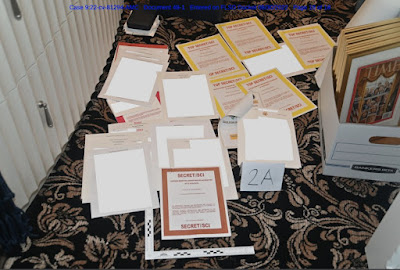To the dismay of many, it was reported that Judge Cannon had the wifi turned off in the courthouse and prohibited reporters from tweeting or otherwise reporting on the hearing from court. There was also no call-in number so members of the public and press could listen in on the hearing. So all of the reporting came after court was concluded. What is this, the dark ages?
UPDATE -- I've been told that the wifi was not turned off and instead it was just overloaded with the number of users; I've also been told that it was not Judge Cannon's new rule to prohibit reporting from inside the courtroom -- she just reminded everyone of the local rule 77.1.
Anyway, here is the NY Times coverage of the hearing:
A
federal judge signaled on Thursday that she remained open to granting
former President Donald J. Trump’s request to appoint an independent
arbiter to go through documents the F.B.I. seized from him last month,
but stopped short of making a final decision.
After
a nearly two-hour hearing, the judge, Aileen M. Cannon of the Federal
District Court for the Southern District of Florida, reserved judgment
on the question of whether to appoint a so-called special master in the
case, saying she would issue a written order “in due course.”
Notably,
Judge Cannon did not direct the F.B.I. to stop working with the files,
which the Justice Department has said have already undergone a
preliminary review by law enforcement officials.
Judge
Cannon, who was appointed by Mr. Trump in 2020, also indicated that she
would unseal a more detailed list of the documents the F.B.I. took
during its Aug. 8 search of Mar-a-Lago, Mr. Trump’s private club and
residence in Florida. She had earlier ordered the Justice Department to
provide the list to Mr. Trump’s legal team at its request. It was not
clear when it would become public.
During the hearing, Judge Cannon pressed the government to explain what harm could come from appointing a special master.
Jay
I. Bratt, the head of the Justice Department’s counterintelligence
section, told her that a special master could slow down an assessment of
the risk and damage to national security being conducted by the Office
of the Director of National Intelligence — as well as an assessment of
whether the seized documents contain the sort of national security
secrets whose unauthorized retention is a crime under the Espionage Act.
“We
are dealing with over 300 records here” that had classification
markings on them, Mr. Bratt said. “That process has begun. That process
needs to continue.”
But Judge Cannon
appeared to suggest that if she did appoint a special master, she would
do so in a way that would not hinder the security risk assessment.
The
judge also left unclear whether she would limit the scope of any
special master’s work to setting aside a small number of documents that
may be subject to attorney-client privilege.



